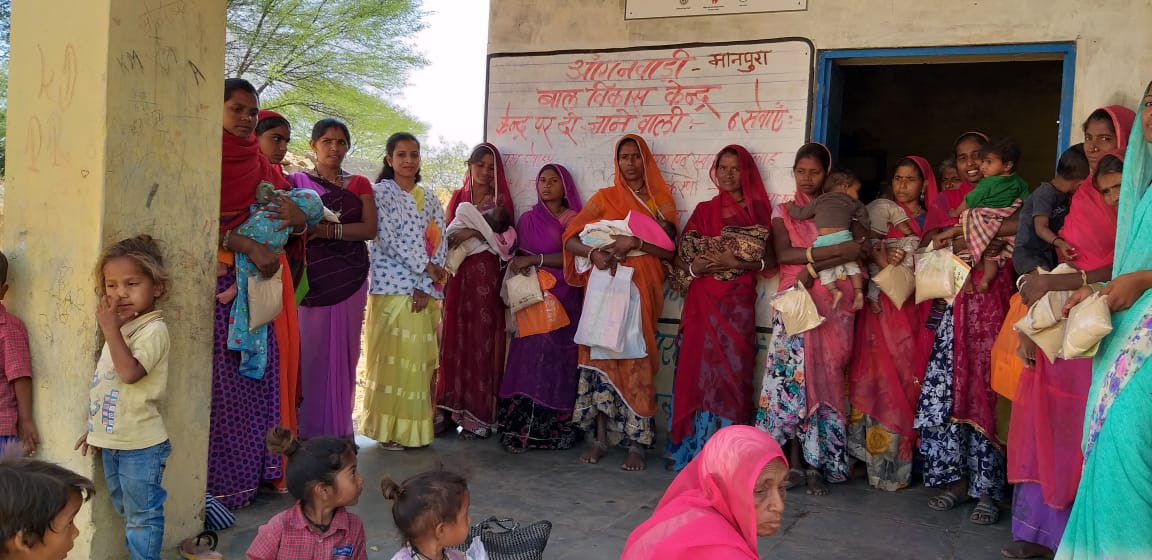India has the largest number of children affected by malnutrition in the world and Rajasthan continues to be one of the bottom five states in the country. UNICEF reports indicate that 43% of Indian children under 5 years are underweight and 48% are stunted due to chronic malnutrition. India accounts for more than 3 out of 10 stunted children in the world.
In 1989, JJVS helped halt a diptheria outbreak that had tragically killed 15 children in the rural outskirts of Udaipur. Since then, JJVS has recognized and emphasized work to help the children of our communities. Malnutrition continues to present one of the primary obstacles facing the children of rural India. In certain communities surrounding Udaipur, JJVS has observed this issue worsening. As a consequence of modernization, diet has shifted from coarse grains like millets and maize to wheat and polished grains that have less nutritional value, contributing to undernourishment among children. With an increasing number of fathers in our community working as migrant labourers, mothers are forced to cope with a greater workload and struggle to provide their children the nutritious food that they need. Furthermore, JJVS studies reveal that many of the mothers in the area are suffering from malnutrition and anemia. This is a major factor which indirectly influences a child’s nutrition from the very beginning, as an unhealthy mother can’t give birth to a healthy child. This creates a vicious cycle of malnutrition and declining health outcomes.
In addition, community systems struggle to cope with malnutrition. Anganwadi workers at health care centers are not trained to recognize the indicators of malnutrition in children, and 82% of Anganwadi centres are deprived of the necessary equipment to measure and address it, like weighing machines, treatment equipment and nutritional supplements aids.
JJVS has developed a plan to support community response to acute malnutrition, particularly amongst children ages 1-6 in our communities, and hopes to implement it in the near future.
JJVS PILOT INITIATIVE – ELEMENTS
The development of a group of Gunis (traditional healers) trained specifically to address malnutrition, particularly by providing locally sourced nutritional supplements and therapeutic food. Gunis are trusted and community-based so especially suited to addressing such a delicate issue.
Education of the community on the importance of proper nutrition, and the causes and symptoms of malnutrition.
Strengthening bonds with the existing health care system to help children get access to the health care resources they need.
Primary surveillance – A primary baseline assessment will be carried out spanning 15 villages to locate affected children. The type of treatment necessary for each affected child will be identified.
Check-ups – Regular health check-ups will be organized to monitor affected children. These children will be routinely monitored throughout their journey to recovery.
Nutrition – Gunis will be trained to prepare nutritional supplements and RUTF (Ready-to-use therapeutic food) with raw material available locally. This will ensure easy, cheap and regular supply of nutritious food to meet the year round requirements of affected children.
Supply of medications – In order to treat children with acute malnutrition and related health issues, nutritional supplements are not enough. Appropriate medicines for each case will be supplied door-to-door, as well as education about the availability of such medicines to the families of the children.
Referral services – For cases that cannot be dealt with at local level, JJVS intends to provide referral services to make sure families know where to get their children the treatment they need.
Working with existing health care systems – JJVS will work to establish a relationship between government health services like ASHA and Anganwadi workers and local people. Gunis will work in coordination with the other health services to organize health camps in the project area. This will limit unnecessary overlap and enable the most children to be benefited.
Role of Gunis – Traditional healers
Gunis will be identified from the 15 villages where the program will operate and trained to address malnutrition in the following 5 aspects. The training of community-based Gunis is essential to ensure the sustainability and long term impact of the project.
Knowledge of available health care schemes addressing malnutrition. This is important so that Gunis can guide parents to the right resources.
How to sensitize communities about the importance of child health care and nutrition.
Practical orientation on formulations of nutritional supplements and RUTF.
Hands on training for proper diagnosis of the specific health issue of each child.
Practical knowledge on preventive and curative measures.
WE NEED YOUR HELP
We believe that this project can help malnourished children recover, prevent undernourishment in the first place, and ultimately, save lives. In order to get this project off the ground, we need your support.

